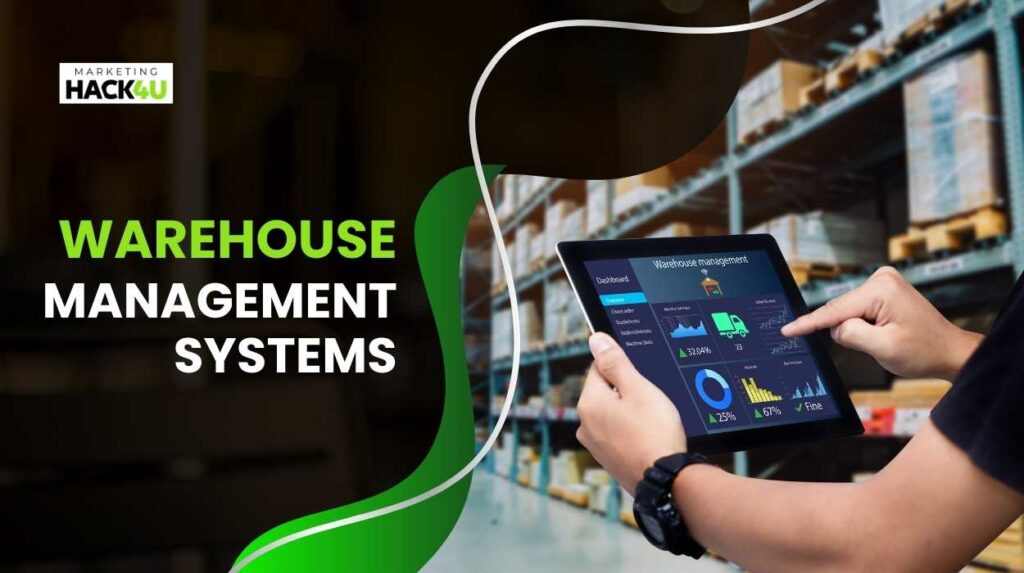Today, inventory management and warehouse operations are of utmost importance because of the fast pace and competition in the business world. Today, more than ever before, warehouses manage huge volumes of goods- the reasons being mainly attributed to the growth of e-commerce and globalization.
It makes all the difference to a business if it can ensure that its warehouse management is at its best for handling inventories, which in turn keeps the customers satisfied and always within the corner. What we will do here is discuss what a WMS is, how it works, some of the essentials one should look out for, and top 10 Warehouse Management Systems that are available in the market today.
What are Warehouse Management Systems?
A WMS is a software solution designed to manage and optimize warehouse and distribution operations. It helps in tracking inventory levels, managing orders, automated storage organization, and enhancing productivity across the warehouse. A WMS provides businesses with a centralized system for managing their day-to-day warehouse operations, including receiving, picking, packing, shipping, and inventory control.
In essence, a WMS automates many of the processes that would otherwise require manual intervention, thus reducing human error and improving operational efficiency. A good WMS is capable of integrating with other systems, such as Enterprise Resource Planning systems and Transportation Management Systems (TMS), to ease the entire supply chain.
How Does Warehouse Management Systems Work?
Warehouse Management Systems functions as a central place from which to control and coordinate the flow of all warehouse activities. Now, let’s briefly consider how it works.
1. Inventory Tracking
All items in the warehouse are tracked by the WMS. The system checks location, quantity, and status about the items. These information pieces are constantly updated since the items are received, moved, or shipped.
2. Order Fulfillment
WMS will manage the picking of products from the right locations, pack and prepare to go out when a shipment is received in the warehouse.
3. Warehouse Optimization
A WMS can assess the warehouse and provide advice about the ideal storage; therefore, one can easily minimize travel time and use up available space.
4. Reporting and Analytics
A WMS supplies data as well as analytics concerning most of the warehouse processes hence enables companies to identify bottlenecks and thus optimize workflows.
5. Integration with other Systems
A WMS can easily integrate with the ERP, TMS and so on thereby providing smooth information flow with no blocks within an organization.
What Features Should You Look For in Warehouse Management Systems?
There are the essential features to look out when selecting a Warehouse Management System:
1. Inventory Management
This WMS should be in a position to do great inventory management with real time tracking, automatic updates in stock management and stock level.
2. Order Management
A good WMS needs to manage order processing with efficiency from picking to shipping and packing. It ought to support multiple kinds of orders, such as multi-channel fulfillment and back orders.
3. Pick and pack Optimization
WMS should be designed in a way that the system provides zone picking, batch picking, or wave picking. These will make the whole procedure more efficient and can easily guide the procedures for packing so that error rate and damage rate will reach their minimum level.
4. Integration capability
The integration of WMS with the systems of ERP, CRM System and all other software applications shall ensure that data interchange flows effectively.
5. Real Time Reporting and Analytics
In real time, activities inside the warehouse can help to give a company the much-needed business decisions in good time. Ensure that the dashboards, customized reports and even predictive analytics are supported in the WMS system.
6. Easy use
WMS should be user-friendly so that employees need not spend much time in training, and the errors that come out as a by-product of usage are very few.
Top 10 Warehouse Management Systems
1. Blue Yonder
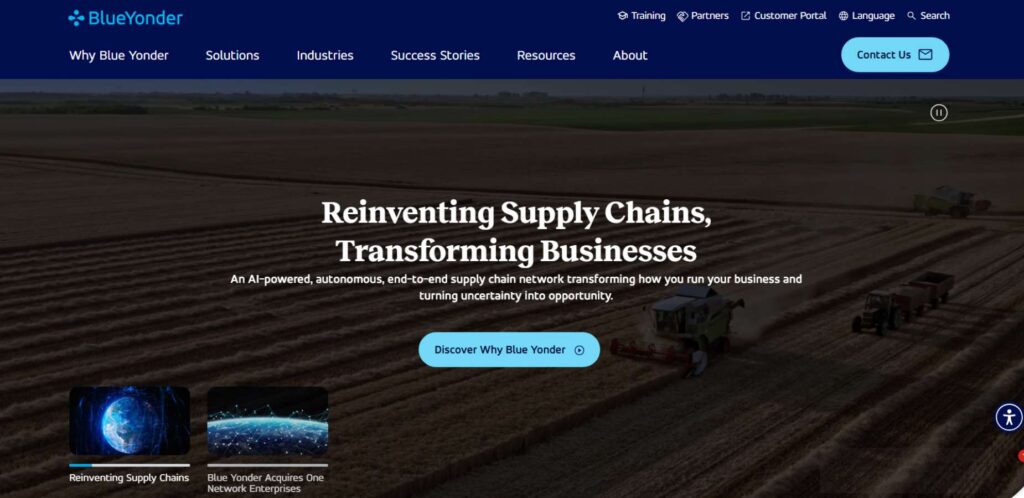
A leader in Warehouse Management Systems Blue Yonder offers supply chain leading cloud-based warehousing using artificial intelligence and machine learning to optimize and execute any warehouse operation, providing full end-to-end visibility on the entire supply chain network and bringing near real-time and real decision-making from the top down with a single version of reality. It is best-in-class software with industry leaders in inventory, labor, and yard management and robust analytics and reporting features.
It is highly scalable and integrates well with other supply chain solutions. It also has advanced slotting optimization along with task management automation capabilities in complex warehouse operations. It also provides robust mobile capabilities for warehouse staff and supervisors as well.
Key Features
- AI-driven inventory optimization
- Advanced labor management
- Real-time analytics and reporting
- Automated task assignment
- Slotting optimization
- Yard management
- Mobile accessibility
Best For
- Large business corporations and companies that operate with complex supply chain operations
Website
www.blueyonder.com
Pricing
- Customized to the size of the company and its requirements; approximately $50,000 per year and above
2. Cin7
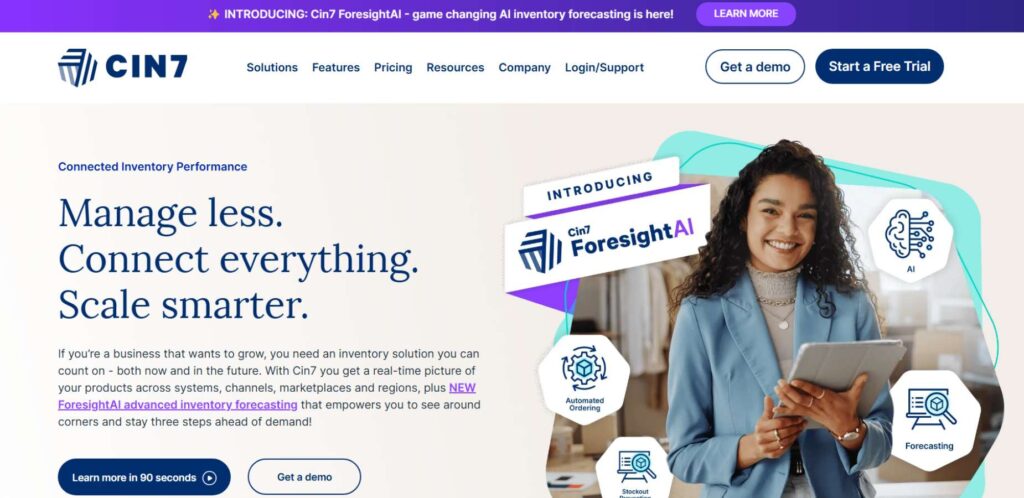
Cin7 is the type of inventory and WMS specifically customized for the small and medium enterprise market. It has the tendency to be significantly integrated into most used services by e-commerce as well as the marketplace platforms used by the online retailer. This particular application even provides live tracking of stocks from different warehouses as well as sales channels.
On top of this, one is also allowed the availability of optimum levels of stock, besides featuring built-in B2B e-commerce functionalities coupled with advanced order management. Cin7 also allows for automated purchasing and reordering capability plus reporting and analytics tools. The warehouse management system provides the business person with a non-technical interface to find his way around, should he/she just be getting started.
Key Features
- Automated PO’s
- Real-time Inventory tracking
- Barcode Scanning
- EDI Compliance
- Production Management
Best For
- Ecommerce business, small and medium-sized businesses
Website
www.cin7.com
Pricing
- Starting at $299/month with multiple pricing options.
3. Fishbowl
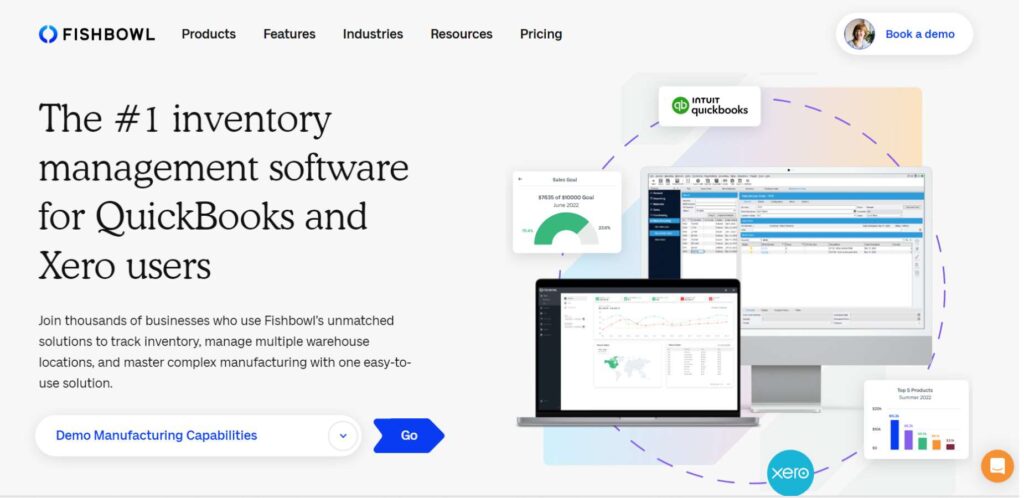
Fishbowl Warehouse is one of the finest inventory management solutions for small and medium businesses, which transcends their elementary requirements for simple inventory management systems. The program integrates well with QuickBooks, so when the businesses use QuickBooks accounting software, the program is always in demand.
One of the biggest advantages of using Fishbowl is for inventory control entirely, including extremely advanced capabilities in picking, packing, and shipping. It keeps track of all the movement of the inventory with absolute accuracy.
Businesses can operate one or more warehouses very efficiently. An inbuilt manufacturing feature supports businesses that manufacture and distribute after producing their product. Features Reportable features and warehouse automation solutions per instance, based on needs.
Key Features
- Integration with QuickBooks
- Multi-warehouse management
- Manufacturing
- Inventory barcode scan
- Order tracking
- Asset tracking
- Customizable reports
Best For
- Small to medium-sized businesses using QuickBooks
Website
www.fishbowlinventory.com
Pricing
- One-time license fee starting at $4,395
4. Infor
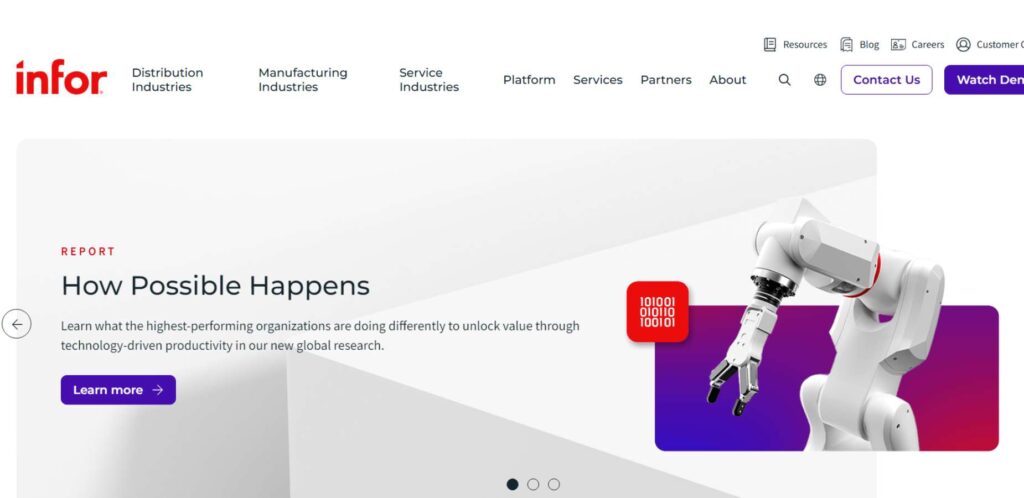
Infor Supply Chain Management is an enterprise-warehousing management system; it provides comprehensive functionality and serves complex warehouse operations through the use of cloud technology which allows real-time visibility and control on all aspects of the chain. It is known for having a labor management ability coupled with sophisticated algorithms applied for inventory optimization.
As one of the WMS under Infor, Voice-enabled picking and RF Devices Support are part of its assistance in providing better overall operation accuracy along with better efficiency. This offers comprehensive customization capabilities. It helps meet a special requirement the industry has made. It also allows performing advanced analytics and business intelligence on the application to render data-driven decisions.
Key Features
- Operations on voice
- Better labor management
- Warehouse Visual Planning
- Auto Management of Workflow
- Predictive analytics
- Cross-Docking facilities
- Optimization of Resource
Best For
- Multi Large enterprise organizations that include sophisticated warehouse activities.
Website
https://www.infor.com/solutions/scm
Pricing
- Customer prices depending upon scope of the deployment and need in perspective
5. Körber Warehouse Management
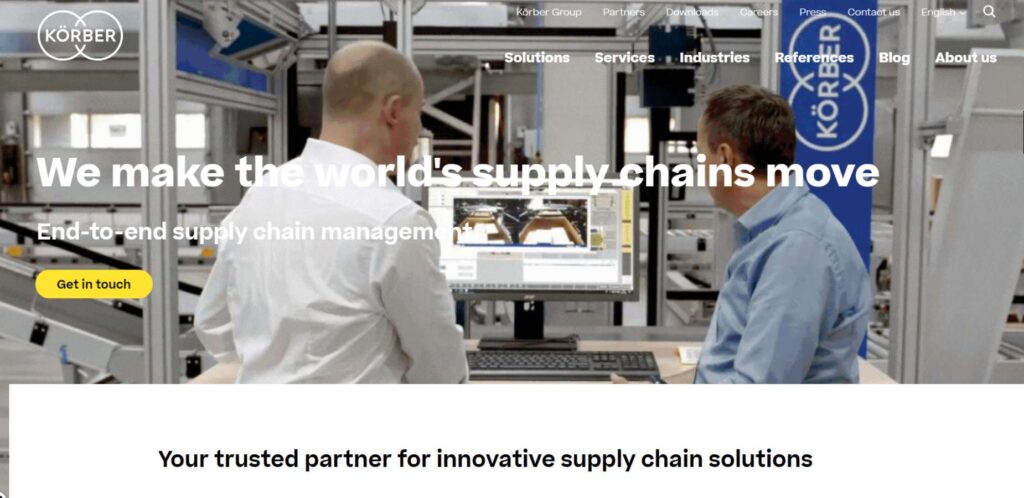
Körber Warehouse Management is highly flexible and scalable to any type and size of firm. As the company has opted for deep functionality along with a great deal of configurability and not necessarily in-house coding, proprietary software development had not been a necessity. The company builds its solutions in state-of-the-art capabilities that are made available on mobile and voice-direct workflows that help the efficiency aspect more.
Körber WMS has the capabilities of integrating so many automation systems and hardware in material handling. The added feature is full labor management capability and advanced analytics, along with specific solutions for cold storage and hazardous material handling.
Key Features
- Configurable workflows
- Voice-directed operations
- Automation integration
- Labor management
- Advanced reporting
- Cold chain management
- Returns management
Best For
- Mid to large-sized businesses requiring flexible configuration
Website
www.koerber-supplychain.com
Pricing
- Custom pricing based on modules and scale of implementation
6. Manhattan Associates
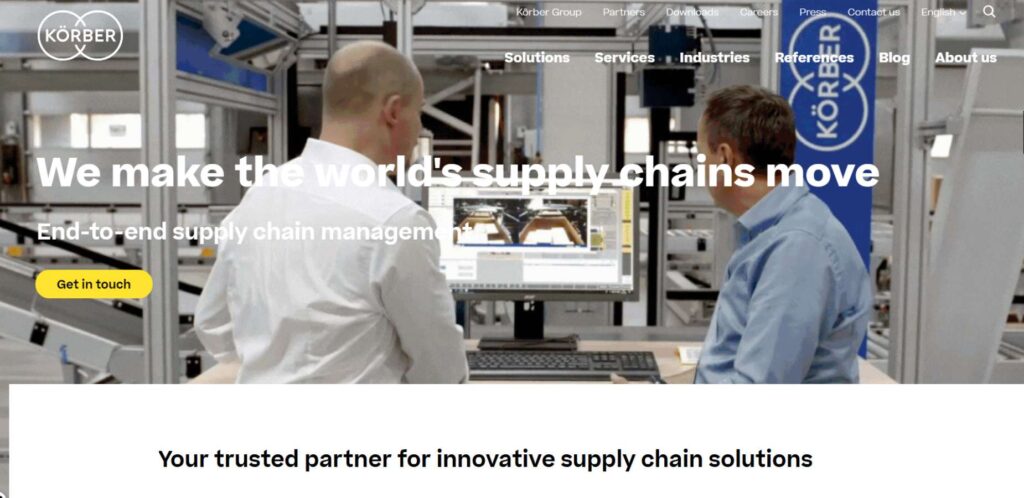
Manhattan Associates is an end-provider of comprehensive warehouse management developed on AI and ML-based optimization for absolutely effective handling of a warehouse. Additional to this are its advancement order streaming capabilities which complement all this with rich labor management functionalities. In more sophisticated aspects of a distribution center and especially in managing inbound and outbound vehicle movements, this system incorporates powerful yard management system software to streamline yard activities and maximize efficiency.
Added on to this is state of the art analytics capabilities with excellent visualization features for deciding what next action by the business. It carries tremendous strength in mobile capability functionalities while having added support through varied abilities in automation. It also features slotting optimization and effective inventory management.
Key Features
- AI-based optimization
- Order streaming
- Labor management
- Yard management
- Slotting optimization
- Mobile usability
- Automation friendly
Best For
- Multinational companies with long distribution chains
Website
www.manh.com/products/warehouse-management
Pricing
- Customized according to business needs and size
7. Microsoft Dynamics 365
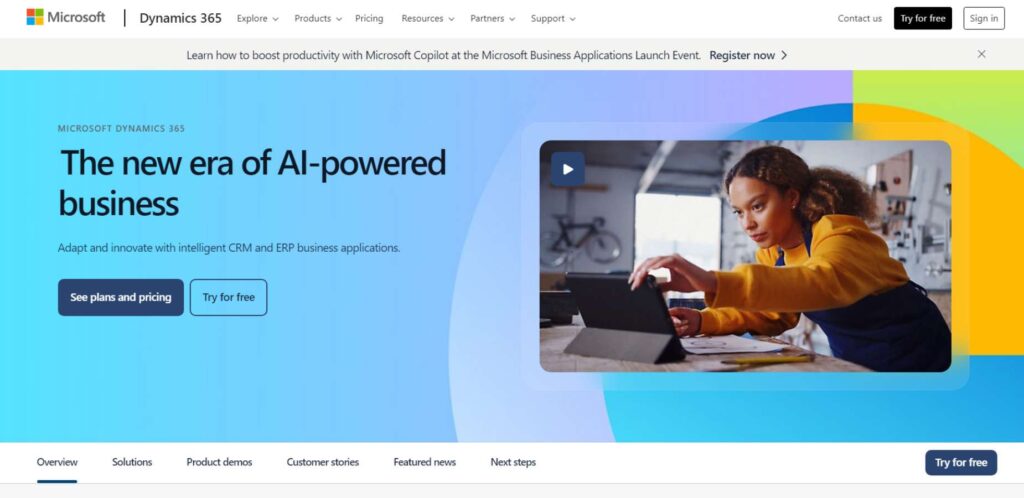
The Microsoft Dynamics 365 Supply Chain Management application consists of a fully featured warehouse management module, which is highly integrated with other business applications of the company. It provides advanced inventory management capability and supports a large number of advanced warehouse operations features. This application offers real-time visibility in the supply chain and provides support for a number of mobile devices in order to manage warehouse operations.
The platform also has powerful analytics integrated into it to help the user track performance. The Microsoft Dynamics 365 platform also allows for the integration of third-party system and IoT devices with wide-ranging capabilities. It also provides advanced quality management integration.
Key Features
- Microsoft Ecosystem Integration
- Advanced Inventory Management
- Mobile Warehouse Operations
- Real-time analytics
- IoT integration
- Quality management
- Cross-platform compatibility
Best for
- Companies that have a deep investment in the Microsoft ecosystem
Website
www.microsoft.com/dynamics365/supply-chain-management
Pricing
- The basic license fee is $180 per user/month.
8. Oracle
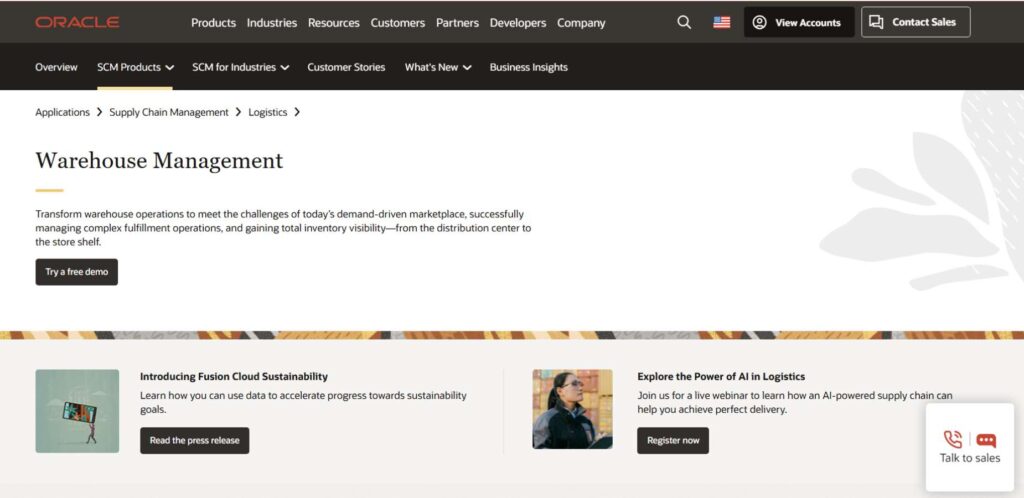
The whole one scalable solution to cater all the complexities of different kinds of warehouse operations falls within Oracle Warehouse Management Cloud. It also enables the availability of complete end-to-end supply chain visibility and control owing to the capabilities within analytics along with the availability of advanced labor management tools plus supporting various types of automations.
The application enables them to support mobile, plus robust tools through their Oracle WMS on systems, which enables robust integration towards working in relation with diverse applications. Other features in the system include sophisticated wave planning and task management capabilities.
Key Features
- Advanced analytics
- Labor management
- Automation support
- Wave planning
- Task management
- Mobile capabilities
- Oracle ecosystem integration
Best For
- This is best for large companies, especially those using other Oracle products.
Website
www.oracle.com/scm/logistics/warehouse-management
Pricing
- Custom pricing based on modules and scale.
9. SAP Extended Warehouse Management
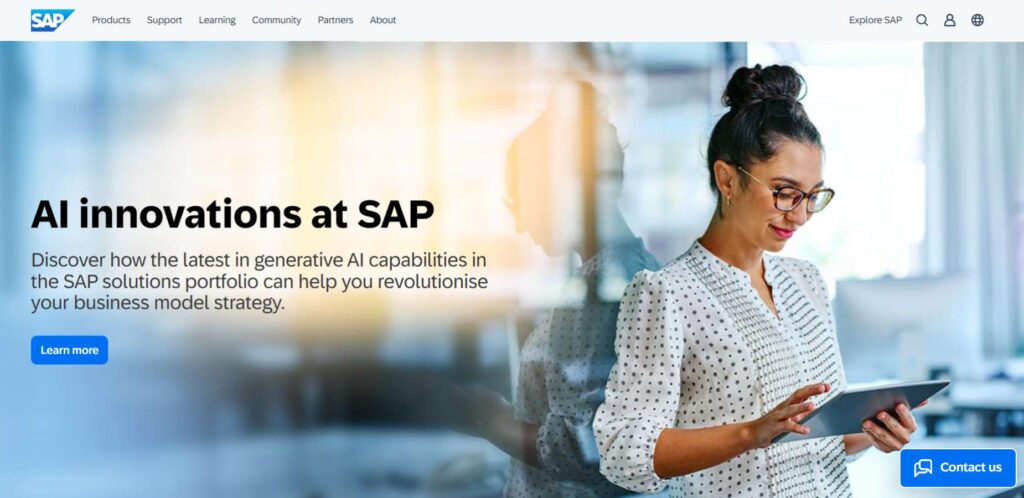
SAP Extended Warehouse Management (EWM) offers advanced warehouse management capabilities with a fully comprehensive solution for complex operations. This shows the movements of inventory, which enables real-time transparency, as well as how the warehouse operates. There are sophisticated labor management tools in addition to supporting technology in automation.
SAP EWM is highly customizable, and the integration with the other modules in SAP is also great. The analytics and reporting capabilities are strongly developed within the system as well. This makes the system better at making effective decisions. In addition to that, it has pretty high robust yard management and very strong quality management capabilities as well.
Key Features
- Real-time visibility
- Labor management
- Automation support
- Yard management
- Quality management
- Advanced analytics
- SAP integration
Best For
- Large enterprises using SAP ERP systems
Website
www.sap.com
Pricing
- Custom pricing according to the scope of implementation
10. Zoho Inventory
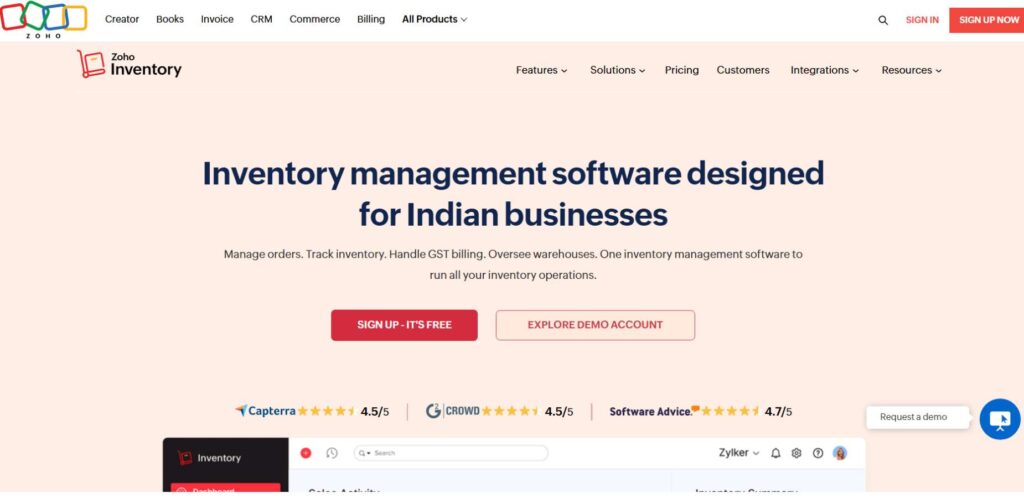
Zoho Inventory is an online inventory management application designed for small and medium-sized businesses. It features multi-channel tracking of inventory as well as order management. It has automatic re-ordering features and multiple warehouses can be handled by this application. Zoho Inventory allows direct shipping integration with all the top carriers. There is real-time tracking facility. All reporting and analytics tools are given to maintain control over the inventories. It also includes integration with other applications that form part of the Zoho.
Key Features
- Multi-channel inventory management
- Automatic reordering
- Shipping integration
- Real-time tracking
- Analytics and reporting
- Support for multiple warehouses
- Integrates with the Zoho ecosystem
Best For
- Small to medium-sized businesses, especially if they are using Zoho apps
Website
www.zoho.com/inventory
Pricing
$59/month
Benefits of Using a Warehouse Management System
1. More Accurate Inventory
A WMS gives the company an accurate real time view of the inventory, hence items can be monitored with minimal errors. Applying barcodes, RFID together with automated entry of the data, a company acquires a more accurate book; this saves money for it prevents a company from overdrafting or under draft its stock to fill orders as it saves on the cost to return orders and corrections.
2. Automates Routine Activities
WMS automates routine activities in the undertaking of picking, packing, and shipping, which in turn helps businesses cut time spent on time-consuming and redundant data entries. WMS optimizes workflow since it guides warehouse workers to the right pieces by showing them the fastest way in the warehouse to take the item.
3. Manage Resources
A labor resource is one of the costlier resources in a warehouse, and a WMS helps manage that resource effectively by tracking productivity and directing tasks to the right person at the right time while relying on that worker’s ability and availability for the task. The use of labor can give management an opportunity to schedule properly, thus reducing idle time and costs of labor.
4. Optimize Space Storage
A WMS will enable the firm to effectively use space within the warehouse as it identifies what and where to keep in accordance with size, demand, and retrieval. Effective planning of space is a tool for stocking much more stuff in the same space that will reduce much space needed in other spaces.
5. Data-Informed Decision-Making
Meaningful data and analytics will help firms make good decisions. Firms identified areas for improvement from the data gathered using inventory turnovers, order trends, and operations efficiency.
Conclusion
One of the modern business needs is a Warehouse Management System in order to properly ease warehouse operations and reduce costs with the enhancements of customer satisfaction. Automation of tasks and resources comes through real-time visibility when using a WMS, this improves the efficiency at which companies can run in order to enable them to adequately respond to dynamic changes happening in the markets. For those organizations, which are aiming to come out on top, say, in the challenging marketplace of the case discussion, a sound long term planning would be to make an investment in a solid WMS.
FAQs
1. What is WMS?
A WMS is warehousing software that manages the activities of all the aspects in the warehouse from inventory tracking until order fulfillment.
2. Who would benefit from a WMS?
It would be helpful to many businesses that have special requirements for warehousing in different types of retailers and manufactures, e-commerce services providers, logistics management providers.
3. Is the use of a WMS Expensive?
The costs vary because of the provider and the type of system. Most of the WMS solutions that are offered have scalable plans, from small to bigger businesses.
4. Can a WMS interface with other systems?
Most WMS solutions are integrated with any kind of ERP, CRM, or TMS Software. Thus, data automatically flows in every business operation of a firm.
